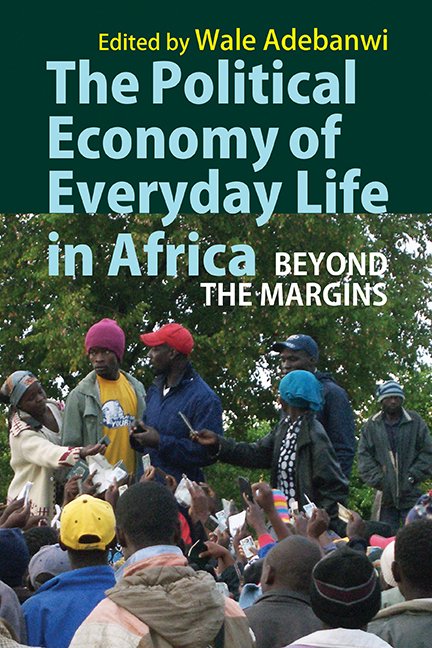Book contents
- Frontmatter
- Dedication
- Contents
- Maps, Illustrations & Tables
- Notes on Contributors
- Foreword
- Acknowledgements
- Approaching the Political Economy of Everyday Life An Introduction
- Part I MONEY MATTERS: CURRENCY & FISCAL LIFE STRUGGLES
- 1 Cattle, Currencies & the Politics of Commensuration on a Colonial Frontier
- 2 Currency & Conflict in Colonial Nigeria
- 3 Coercion or Trade? Multiple Self-realization during the Rubber Boom in German Kamerun (1899–1913)
- 4 The Macroeconomics of Marginal Gains Africa's Lessons to Social Theorists
- Part II LABOUR, SOCIAL LIVES & PRECARITY
- Part III MARGINALITY, DISAFFECTION & BIO-ECONOMIC DISTRESS
- Part IV HISTORICITY, TEMPORALITY, AGENCY & DEMOCRATIC LIFE
- Afterword: The Landscapes Beyond the Margins Agency, Optimization & the Power of the Empirical
- Index
4 - The Macroeconomics of Marginal Gains Africa's Lessons to Social Theorists
from Part I - MONEY MATTERS: CURRENCY & FISCAL LIFE STRUGGLES
Published online by Cambridge University Press: 31 August 2018
- Frontmatter
- Dedication
- Contents
- Maps, Illustrations & Tables
- Notes on Contributors
- Foreword
- Acknowledgements
- Approaching the Political Economy of Everyday Life An Introduction
- Part I MONEY MATTERS: CURRENCY & FISCAL LIFE STRUGGLES
- 1 Cattle, Currencies & the Politics of Commensuration on a Colonial Frontier
- 2 Currency & Conflict in Colonial Nigeria
- 3 Coercion or Trade? Multiple Self-realization during the Rubber Boom in German Kamerun (1899–1913)
- 4 The Macroeconomics of Marginal Gains Africa's Lessons to Social Theorists
- Part II LABOUR, SOCIAL LIVES & PRECARITY
- Part III MARGINALITY, DISAFFECTION & BIO-ECONOMIC DISTRESS
- Part IV HISTORICITY, TEMPORALITY, AGENCY & DEMOCRATIC LIFE
- Afterword: The Landscapes Beyond the Margins Agency, Optimization & the Power of the Empirical
- Index
Summary
Introduction
In his 1974 Nobel Prize lecture titled ‘The Pretence of Knowledge’, Friedrich von Hayek chastised his fellow economists about their love affair with analytical approaches that mimicked physics or biology, especially after their discipline had ‘been conceded some of the dignity and prestige of the physical sciences’. He argued forcefully and convincingly that some of the gravest errors of economic policy are a direct consequence of this ‘scientistic error’ (von Hayek 1974). Decades later, his criticism of economic methodology in general is still valid and has been endorsed by a wide range of economists, including some of the most influential in the field (Solow 2008, 2009; Krugman 2008; Stiglitz 2010; Caballero 2010). The ‘scientific’ validity of economic methods has become even more controversial in the aftermath of the 2008–09 Great Recession, and for a good reason: the crisis confirmed once more that the assumptions of markets as optimal institutions where rational and generally well-informed agents make individual decisions that eventually serve the interests of society as a whole were misleading. Yet, these assumptions remain the foundations on which modern economic theory is built.
Jane I. Guyer's work of social and economic anthropology, which focuses on the grey zones between formal and informal economies where various patterns of confrontations and collaboration constantly take place, sheds light on how economic agents facing hard budget constraints but eager to conform to sets of social norms make decisions, how the productive economy in such settings actually works, how the division of labour among heterogeneous groups takes form, and how the money is managed to serve as a unit of account, a medium of exchange and a store of culture, meaning and value. It is to their own detriment that macroeconomic theorists have not paid more attention to the stunning insights from the very practical analyses of how people perform economic relations ‘on multiple and overlapping scales of value’.
This chapter, which draws on Monga (2011, 2015), builds on some of the insights from Guyer's landmark book, Marginal Gains: Monetary Transactions in Atlantic Africa (2004) and discusses the state of macroeconomic theory today to suggest a few lessons that social theorists could draw from the study of Africa.
- Type
- Chapter
- Information
- The Political Economy of Everyday Life in AfricaBeyond the Margins, pp. 115 - 132Publisher: Boydell & BrewerPrint publication year: 2017

